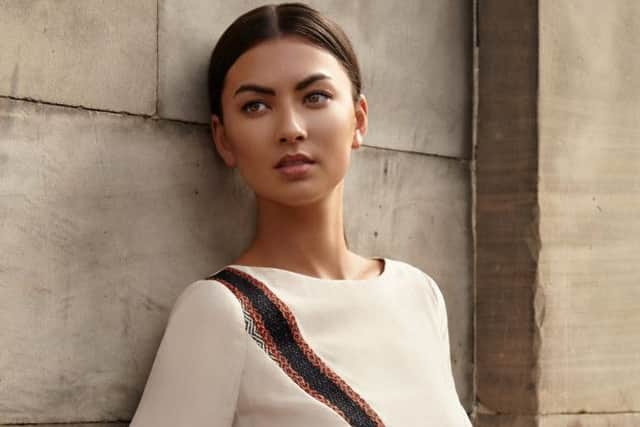Fashion: Ala Mairi’s dual-nation heritage


EDINBURGH clothes designer Fatima Mahmood had flown to Lahore in Pakistan to visit family and source materials for her fashion label, Ala Mairi, when the country was hit by flooding in 2011. Rather than sit and watch the tragedy unfold on the TV screen, she and her sisters loaded up their car with food and clothes and drove to Rawalpindi and the worst affected areas.
“We wanted to help, so we went to the welfare and community centres where the flood relief was being organised. There were a lot of women there who went to those centres to learn needlework. I thought I could help them by using their skills, training them and guaranteeing them an income. So I went back to Lahore, got some Harris Tweed cloth I had with me, took it back to Rawalpindi, and asked them to make up some samples.”
Advertisement
Hide AdThe result of this cross-cultural collision of Scottish and Pakistani textile skills was Ala Mairi and its collections of dresses, tops, scarves and trousers hand woven from silk, cotton, linen and Harris Tweed. The Scottish influence can be seen in the Fair Isle motifs, Shetland lace, tweed and handloom weaving, while the Pakistani element is there in the hand-dyed raw silk and intricate embroidery. Mahmood supplies the cutting edge fashion sense.


It is this unique blend that sums up what Mahmood’s fashion label Ala Mairi is all about, a mixture of the two cultures she inhabits, and a desire to preserve the traditional skills of both.
Mahmood was also keen to produce as ethical a product as possible, so everything from the materials to the manufacturing process and the conditions in which the workers are employed has to be to her satisfaction. Everything is hand-dyed and there are no chemicals involved.
“I didn’t plan it to be a luxury product, but it ended up like that because it’s 100 per cent silk and hand-made, which means we can make bespoke designs,” she says.
Using independent, small-scale artisans, Ala Mairi’s aim is to generate a sustainable income for both Scottish and Pakistani workers and the brand has been awarded Positive Luxury’s Butterfly Mark for its commitment to maximising social impact whilst minimising environmental impact.
“Positive Luxury is an amazing platform and we’re delighted they recognise us because we’re a new brand. We are an innovative product that is unique.”
Advertisement
Hide AdBorn and raised in Pakistan, Mahmood came to Scotland when she married at 19 and worked with her husband in retail, while bringing up Maryam, now 21 and an architecture student, and Noor, 12.
“I always wanted to do something with design, but after I got married I went straight into business with my husband and never got the chance. Then we sold the business and I was able to do an art and design course, then went to college and did an HND in Fashion and Stitch Textile as a mature student of 42. I did pattern cutting and seamstress classes too.
Advertisement
Hide Ad“About the same time as I finished college in 2009, I had seen a documentary about Harris Tweed and the demise of handloom weaving skills and thought those skills should be saved. So we travelled all over Scotland searching for handloom weavers and Shetland lace makers, and on visits to Pakistan found the hand embroiderers, silk weavers and dyers,” says Mahmood.
“In Pakistan, I visited the bazaars and had wooden printing blocks made. It’s very unusual for women to walk about in a bazaar and ask the men to make something. My sisters would ask why I was embarrassing them in the bazaar, then they would just say, ‘She’s Scottish.’”
It all came together with the first collection in 2013, and Ala Mairi has just released its second capsule collection and its blend of Fair Isle motifs, sunset in the Shetlands and Pakistan’s vibrant colour palette is reaching a growing market online, in the US and Europe.
“I wanted to help artisans live with dignity and also hand their talents down to future generations. Ala means excellent beauty in Arabic and Mairi is the Scottish part, a girl’s name that means drop of the sea. In both countries there are people with the skills,” says Mahmood.
“In Scotland we have nine handloom weavers working with us and some of them are in very remote areas. I love meeting them. I don’t want to take their ownership of design so they do that and I supply the yarns.”
In Pakistan, Ala Mairi has teamed up with the women’s welfare centre in Rawalpindi to help provide a safe environment, training and creative space.
Advertisement
Hide Ad“I want to help women in Pakistan find a livelihood. All of the women coming to learn the skills are victims of some kind of crisis. For example, one was left by her husband with two children, and was living with her father, who blamed her for her bad luck. Now she can earn a living and turn things around.
“I wanted to know what was going on in their lives. When you are working together, they are very open. It makes me want to succeed more with Ala Mairi. I believe social entrepreneurship is much deeper than just being an entrepreneur. You are thinking about everyone in the project and not just yourself,” says Mahmood.
Advertisement
Hide Ad“I wanted to start small and know the names of all the women and what they had done. They have a different life now. I want to make a good workforce. There might now be 150, but I want the first ten to still be there, getting a sustainable income. I know then that we have changed ten women’s lives and I can knock on their door and they will give me tea and smile and call me sister. I can make a change to a small community,” she says.
“There is a growing market, especially online, in Europe and America in high-end boutiques and stores, and we want to have the same in Scotland.”
Twitter: @JanetChristie2
• Ala Mairi designs range from £150 for scarves up to £600 for dresses. See www.alamairi.com for stockists